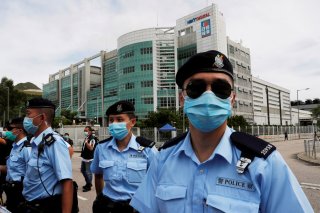How China’s Crackdown On Hong Kong Will Affect America
A new national security law is making waves in East Asia.
In China's most recent step to crackdown on Hong Kong, Beijing has imposed a new national security that strips Hong Kong of its unique legal status and autonomy. This has unclear implications for American interests and raises many questions for Washington and its Asian allies. How does Taiwan view this latest fait accompli, following Beijing’s unilateral declaration of South China Sea sovereignty, its dredging operation to create new features in the Spratly Islands, and its militarization of these new features? What are the political and security implications for the United States in the region?
The Center for the National Interest has gathered three very well-qualified speakers to discuss these trends and their prospects:
· Ambassador Steve Young, formerly our Ambassador to Kyrgyzstan, served as U.S. Consul General in Hong Kong, and later as Director of the American Institute in Taiwan, our de facto embassy there. Born in Washington, D.C., he moved to Taiwan at age twelve while his father served as an advisor to Taiwan’s Army in Kaohsiung during the early 1960s. His State Department service includes the Bureau of East Asian and Pacific Affairs, and Director of the Office of Chinese and Mongolian Affairs. He is a veteran of two tours in Moscow and a tour in Beijing. He holds a B.A. from Wesleyan University, and an M.A. and Ph. D from the University of Chicago.
· Dr. William A. Stanton is a thirty-four-year veteran of the State Department. He served as Deputy Chief of Mission in Seoul, Korea, and Canberra, Australia. He was Chargé d’affaires ad interim for twenty-two months in Australia. He served in Beijing twice, for a total of six years. His final posting was as Director of the American Institute in Taiwan, where he successfully managed Taiwan’s entry into the U.S. Visa Waiver Program, two major security assistance agreements, and the re-introduction of U.S. beef into Taiwan. Upon retirement, he remained in Taiwan as Vice President of National Yang-Ming University. His most recent accomplishment there is the creation of a DOD-funded flagship Chinese Language Program, with the first students arriving in February.
· Lieutenant Colonel (ret.) Daniel L. Davis is currently a Senior Fellow and Military Expert at Defense Priorities, a think tank based in Washington, DC. A distinguished combat veteran, he is a regular contributor to Fox News, BBC World News, CNN, and CNBC. His work on defense, foreign affairs, and social issues has been published in the New York Times, Financial Times, CNN, The Guardian (UK), US News & World Report, the National Interest, and other publications. His recently published work in The American Conservative: "Should the United States Go To War If Taiwan Is Attacked," is on our topic.
Lieutenant General Wallace C. Gregson (USMC, Ret.), Senior Director for China and the Pacific at the Center for the National Interest, served as moderator. Gregson is a former US Assistant Secretary of Defense for Asian and Pacific Security Affairs and previously served as Commander, U.S. Marine Corps Forces Pacific.
A video for the discussion appears above and can also be found here.
Image: Reuters.

